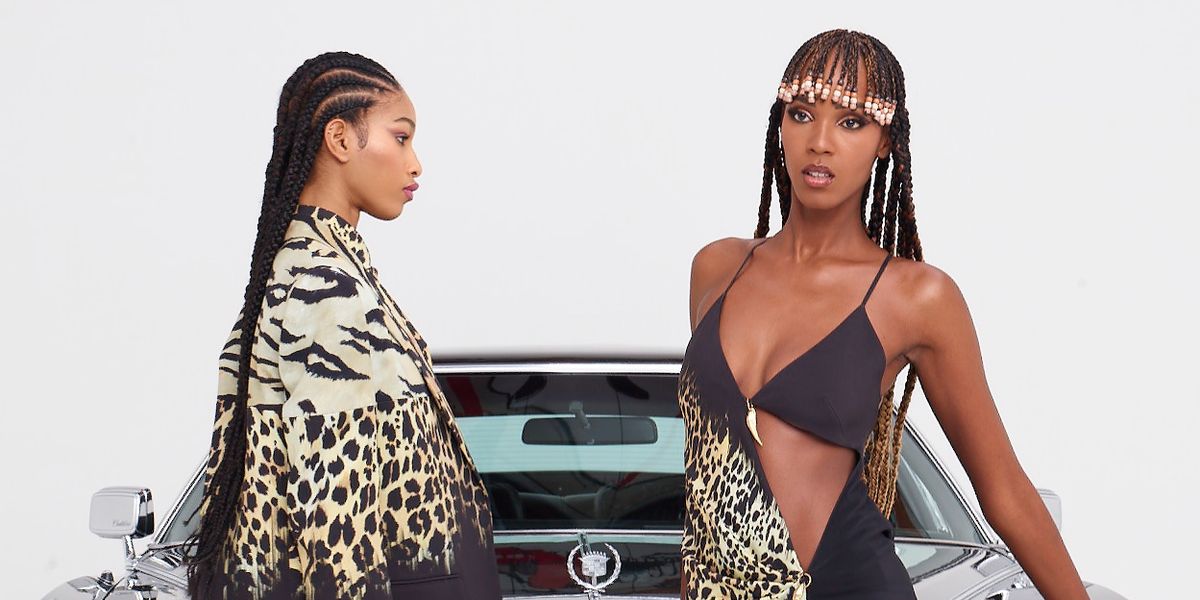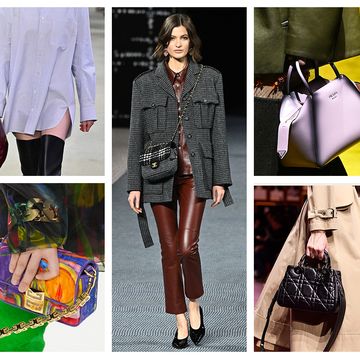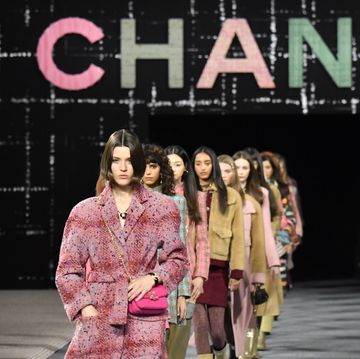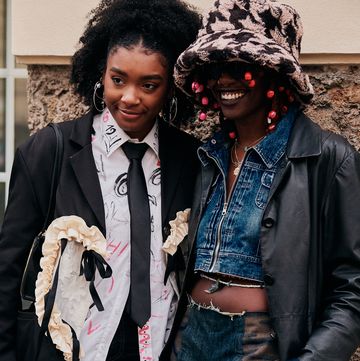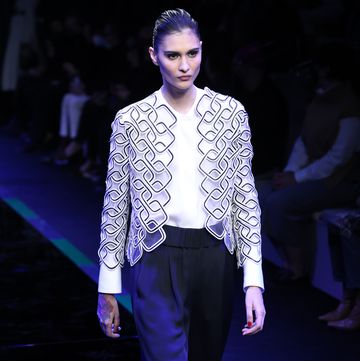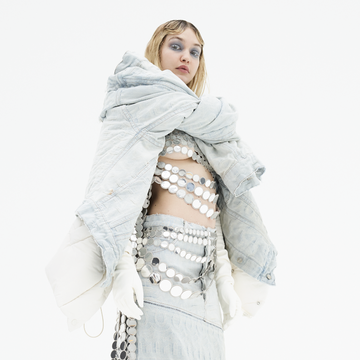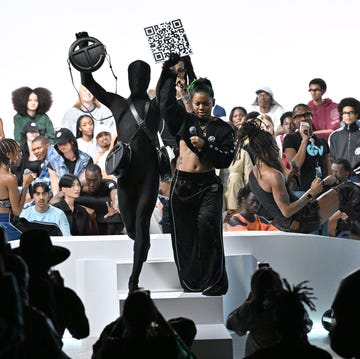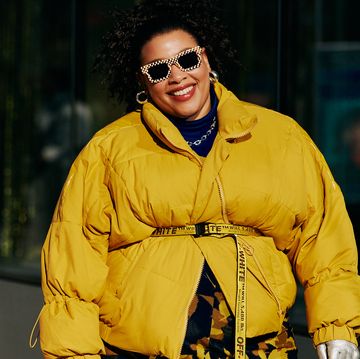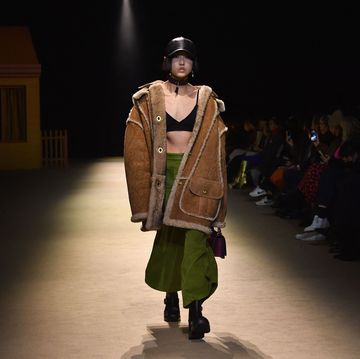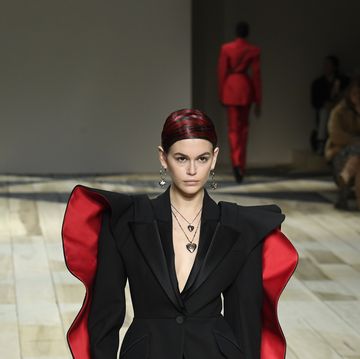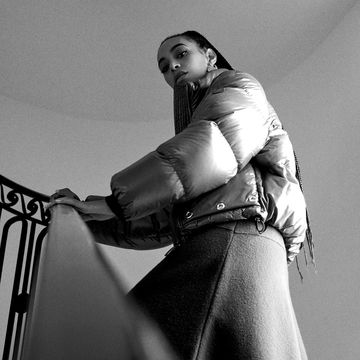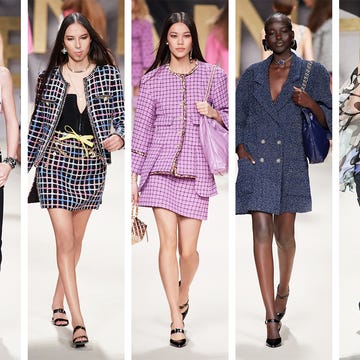"That's when I realized, I was holding on to a Roberto Cavalli outfit and throwing away my relationship," Carrie Bradshaw mused on Sex and the City while fighting with Aidan. He needed closet space, she needed couture. We know the outcome of that doomed relationship, because the choice should never be made between men and fashion. Cavalli outlives it all, even if there is a flimsy reboot in the making.
You know a Cavalli dress when you see one. With a penchant for outlandish prints and a predilection for hypersexual silhouettes, the brand is known for its cheeky mix of Barocco overindulgence coupled with the overindulgence of the 2000s. Celebrity and cultural allegiances were forged between the brand and style icons like Jennifer Lopez, with Kim Kardashian more recently sourcing her vintage wardrobe from Cavalli's rich archives.
But Roberto Cavalli does not exist in a vacuum. Founded in 1975, well before the height of the '90s Italian runway invasion, Cavalli has since established itself as a brand with staying power. It was helmed by both Paul Surridge and Peter Dundas, respectively, in the past five years. When Fausto Puglisi was named its new creative director in September 2020, the hope was to rebuild the brand from the ground up. The brand is intrinsically tied to the extravagance of the post-millennial era, but Puglisi wants to bring its 2000s aesthetic into our 2021 world.
"Okay, let's rewind. Let's write a new book. This is a preface," Puglisi told me over Zoom.
With animated gesticulations that lend themselves well to a virtual chat, Puglisi said he understands the gargantuan task at hand. He doesn't aim to rewrite the brand's history—"It's important to respect the DNA of a brand"—but he wants to bring it out of its famed archives and support a modern approach to dressing. In his debut collection for the fall-winter 2021 season, dubbed "Season Zero," he's marrying the past with the present. We see obvious nods to Cavalli house codes in animal prints and a standout, bias-cut dress inspired by one worn by Cindy Crawford. The gown Aaliyah wore to the 2000 MTV Music Awards is now strapless but features the same feathered slit. Denim, which Cavalli is known for, is reinterpreted in a sandblasted, wide-legged pant. A section of the collection is unisex, an important shift for Puglisi's revisioning of the iconic label.
"It's very democratic and demographic," he says. "I'm trying break the boundaries of age, skin, culture. They live together, a masculine suit with an ultra sexy frock. It's important that really the Cavalli woman is all the women. I can't stand people say it's sexy or it's not sexy. It's conservative or not conservative."
Read on to for Puglisi on his personal triumphs designing during the pandemic, the legacy he intends to uphold, and his thoughts on Generation Z.
On redefining Cavalli’s legacy
We are talking about a brand which is famous for its strength, power, imagination and eccentricity. It's connected to Diana Vreeland, to Tony Duquette. Cavalli is connected to the 2000s. It was Carrie from Sex in the City talking about Roberto Cavalli. It was J.Lo for Cavalli and Sharon Stone for Cavalli. It was the Golden Globes and the MTV Awards and the parties at Central Park or the Cannes Festival.
It's a challenge because this brand is still extremely alive in the mind of the people. In the past five years they didn't really have the strategy, probably, that a brand like Cavalli deserved. So it's a strong challenge but I'm putting all my energy and efforts to make this [shift] happen. I tried to design a collection that tried to talk to different kinds of women. So take off the flashy colors, work with different skin tones. I believe that I have a deep responsibility to be able to talk to different kinds of customers, which is my goal.
On creating during a pandemic
The world that we are living in is constantly sucking your blood, your energy, and it's asking you to give more and more and more. I'm a dreamer. There are so many people in the world that want just to travel, travel just to take selfies, and they don't see anything where they are. I believe that there are people that can stay home reading a book trying to create their own fantasy. I'm like this. There was something selfish with my situation [during the pandemic]. It was a moment to challenge myself. It was about me as person, as human being, and I started to cook. I took my time not to design, not to create, but to listen to music, to read a lot, to watch the movies I like and to calm down a little bit. It was a moment to reflect.
Then I found Cavalli. Amazing people, a great team. Creating his collection was very energetic, because in Italy our people suffered. They're still suffering. But there is hope. It's beautiful.
On Gen Z's relationship to style
There is this section [in my collection] which is genderless. What I believe about the younger generation is that they don't like things that are too obvious. I can wear my boyfriend's jacket, you can wear your girlfriend's pants. We are living in a society that is very fluid now. There are not any kind of segments. Everything is very connected with the young generation most of all, which is fantastic, because my generation was not like that. The next generation is proving that they're able meet the super sexy dress with a cool babouche, to stay home or to go out.
On mindfully designing for 2021
I wanted to take the kind of flashiness off Cavalli because we're in a pandemic. It's a moment that is very sad for the world. I didn't want anything that was too flashy, but I want it to be eccentric, which is different. I wanted different kinds of feminine attitudes because a woman today doesn't need a designer to tell her to wear this design—a woman can mix and match it herself.
On the future of fashion
What we need is less consumerism. We need to reflect a lot about the products. We need to reflect a lot about the quality. We need to spend more to spend less on clothes, respecting the human craftsmanship.
After the vaccine, I can't wait to have you in Milan and I can't wait to come to New York. I can't wait to share with the people I love and respect, the journalists, the buyers, the clients. I only can pray and hope that everything will come like it used to be in terms of people spending time together. Fashion was born as a community.
Justine Carreon is the market editor at ELLE.com covering fashion, Dutch ovens, and fashion again. When she isn’t approaching style through a modern, accessible lens, she’s scouring eBay for vintage Levi’s and pretending she knows how to surf. Before joining ELLE.com in 2015 she worked as a freelance writer and stylist in New York City.
